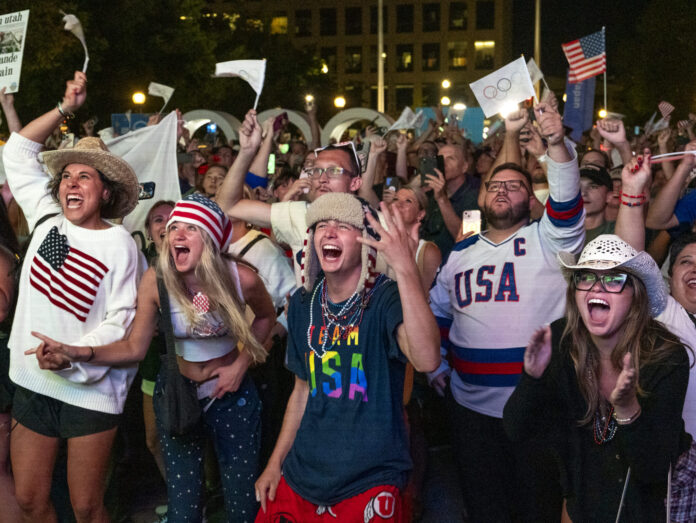
(Utah News Dispatch) — It was just after 4:20 a.m. in Salt Lake City, where a crowd of about 2,000 Utahns — many of them sporting 2002 Olympic hats, jackets, and other memorabilia — waited with bated breath as the International Olympic Committee voted Wednesday on whether Utah would again host the Winter Games in 2034.
“Come on!” someone shouted as the crowd watched two big screens broadcasting the vote from Paris. Then the crowd erupted into roaring cheers when KSL TV’s broadcast showed bid leaders, including Utah Gov. Spencer Cox, Salt Lake City Mayor Erin Mendenhall, and Fraser Bullock, president and CEO of the Salt Lake City-Utah Committee for the Games, jump out of their seats with their hands clasped and pile into a group hug.
The International Olympic Committee voted 83-6 to officially award the 2034 Winter Games to Salt Lake City. And with that, the decision was official. The Olympics will indeed be returning to Utah — capping off years of work to bring the Games back to the Beehive State.
The excitement in Utah’s capital city was palpable — energy Mendenhall said she could feel from all the way on the other side of the world in Paris, where the 2024 Olympics are set to kick off on Friday.
“We are here because of you,” Mendenhall told the crowd on KSL TV’s broadcast. “We have heard from Olympic partners that our facilities are great, but it’s the people of Salt Lake City and Utah that make our bid so exceptional. We are here because of your energy. We can feel you from Paris.”
Mendenhall said she “couldn’t be more proud to be your mayor today.”
BREAKING: After a long moment of quiet tension while the #SLC crowd waited for the IOC vote to come in, Washington Square erupted in cheers as Salt Lake City Utah was officially picked to host the 2034 Winter Games #utpol pic.twitter.com/jolTr4cnUV
— Katie McKellar (@KatieMcKellar1) July 24, 2024
“This is the most proud day of Salt Lake City in my time,” she said. “I’m so proud of you, Salt Lake City.”
Salt Lake City’s program celebrations went on as planned, including a drone show that displayed the Olympic Rings and outlines of skiers, snowboarders, bobsleds and more above the Salt Lake City-County Building at the heart of Utah’s capital city. Shortly after the official announcement, the Olympic cauldron burst into flames at the University of Utah’s Rice Eccles Stadium.
Utahns — some bleary-eyed but many more buzzing with excitement — came to Washington Square as early as 2 a.m. to watch the IOC vote play out. Others camped along the edges of the downtown city park in anticipation of the city’s July 24th parade to celebrate the state holiday of Pioneer Day.
Spirits remained high through the night — but before the vote came through, there were some tense, quiet moments and scattered, confused mutters from the crowd when IOC officials prefaced the vote with a lengthy discussion about anti-doping efforts and concerns about the U.S. respecting the World Anti Doping Agency (WADA).
Anti-doping drama
Earlier this month, the Associated Press reported that the international swimming federation’s top administrator had been ordered to testify as a witness in a U.S. criminal investigation into the case of 23 Chinese swimmers who failed doping tests in 2021 yet were allowed to compete. The case “could become the highest-profile use so far of a U.S. federal law passed in 2020 in fallout from the long-running scandal of Russian state-backed doping in sports,” the AP reported.
In response, the Association of Summer Olympic International Federations issued a statement on July 12 saying it was “greatly concerned” that leadership of one of its member federations had been ordered to testify as a witness in the federal investigation.
“The US criminal investigation into an anti-doping case on foreign soil, and the recent position of the US Anti-Doping Agency, threaten to undermine the role and independence of WADA, and by extension, trust and confidence in the global anti-doping system and the autonomy of sporting rules and regulations,” the statement said. “Independent prosecutor Eric Cottier’s interim report stated that WADA’s actions showed no bias towards China and that WADA’s decision not to appeal the contamination scenario presented by the China Anti-Doping Agency was ‘indisputably reasonable.’”

The issue even cast a question over whether the IOC would actually award Utah the 2034 Olympics as expected on Wednesday, Cox said, but an amendment to the city host contract requiring the 2034 Winter Games to respect the authority of WADA and the world anti-doping code addressed a majority of IOC officials’ concerns, enough to proceed with solidifying plans for the 2034 Winter Games in Utah.
“Now it has nothing to do with Salt Lake City, nothing to do with our bid,” Cox told KSL TV after the vote. “It has everything to do with a law that was passed in Congress several years ago that is now being enforced in ways that some people in the IOC are not happy about.”
Cox added Utah and Salt Lake City officials will “work closely together to resolve that. But most importantly, the Games are coming back.”
“We can’t wait to bring the world back to Utah,” he said.
During the final pitch to the IOC laying out Utah and Salt Lake City’s vision for a 2034 Winter Games, Bullock addressed concerns around respecting WADA’s authority during his remarks.
“We strongly support WADA’s efforts as the ultimate global authority on anti-doping, and we strongly support WADA’s mission,” Bullock said, adding the Association of Summer Olympic International Federations has raised “valid concerns about how anti-doping enforcement may be conducted in the U.S.”
“We take these concerns very seriously,” Bullock said. “We want our friends to feel very welcome and safe in the United States. In this respect, we totally respect reinforcing the Olympic host contract. We are 100% committed to that effort.”
IOC officials expressed gratitude for Utah and Salt Lake City officials’ commitments to work with them on the issue — as well as some sympathies that the controversy created some uncertainty for the Salt Lake City-Utah bid in the days leading up to the final vote.
“We’ve been at this for 22 years,” Bullock said of the effort to bring the Olympics back to Utah, holding up two fingers. “And something like this happens. It has nothing to do with us. But it has to do with our country, and it has to do with the Olympic movement … so we’ve got to get this right.”
Bullock said “we need to bridge the gap and bring everybody together” to address the situation. “And the genius of the amendment in the host city contract brings pressure to make that happen.”
GET THE MORNING HEADLINES DELIVERED TO YOUR INBOX
“We can be a catalyst,” he said, pointing to Cox’s remarks during his bid presentation that the state likes to tout its “Utah Way,” a catch-all phrase politicians like to use to say Utah leaders tackle issues by collaborating across party lines.
“We can help, in our way, bring parties together to work on this problem now,” Bullock said. “You have our commitment to do so, and you have ultimate protection in the amendment to the host city contract.”
Cox told IOC officials that he, too, is concerned about politicization of sports.
“We are your allies in this process,” he said, adding “we support WADA in every way possible.”
The governor said he and Mendenhall will “use the politics of our offices” to work with federal officials — regardless of who is elected president in the upcoming November election — to address concerns around the U.S.’s response to doping allegations.
“We will use all levers of power open to us to resolve these concerns,” Cox said.

Utah mother, daughter look forward to another Salt Lake City Olympics
While waiting for the official announcement, one mother and daughter quietly hugged each other amid the crowd while those around them screamed and cheered.
Elisa and Patricia Huhm, 28 and 61, told Utah News Dispatch they came to the Washington Square celebration early Wednesday morning because the chance to see the Winter Games together would mean the world to them.
In 2002, Patricia Huhm said she was bedridden while she was pregnant, after previously losing two pregnancies, and she wasn’t able to attend the 2002 Winter Games even though she had bought tickets.
“I couldn’t make it,” she said. So now, presented with another chance to see the Games, Patricia Huhm said she told her daughter they had to go to Washington Square to celebrate. “I’m alive. You’re alive. Tonight is the night.”
Patricia Huhm said another Olympics in Utah is an opportunity to bring people together — “to celebrate life, to celebrate sport.”
Elisa Huhm said she’s grateful for the sacrifices her mom made to bring her and her siblings into the world, and she would love to watch the Winter Games with her in 2034, but Wednesday she was simply excited to be there with her for the announcement.
Further, Elisa Huhm said she sees the Olympics as an opportunity to unite people across the country and the world, despite polarizing politics.
“There’s a lot of things that are dividing people … but I think the Olympics and sports has a way of uniting people that’s unique,” she said. “So I think it would mean a lot for the U.S. and Utah to be able to host the Games here.”
While Patricia Huhm said she was said to miss her chance to see the Games in 2002, she’s now excited for another opportunity in 2034.
“Second chances are real,” she said.




![Vikings hold on to win top-10 thriller against Jefferson [VIDEO]](https://nowhabersham.com/wp-content/uploads/2025/01/maxresdefault-7-218x150.jpg)
![Aldridge paces Lady Dragons to 11th straight win [VIDEO]](https://nowhabersham.com/wp-content/uploads/2025/01/maxresdefault-6-218x150.jpg)

